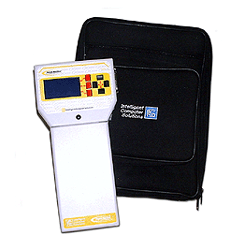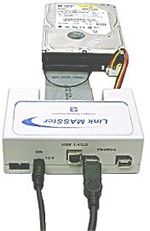In the previous article, we had discussed the requirements of Indian Evidence
Act for the admissibility of Electronic Evidence. In this article we shall
discuss the hardware required for making copies of hard disks for further
analysis.
In most of the incidents of Cyber
Crime investigation by the Police or suspected fraud in a Corporate network,
it becomes necessary to seize the suspect Computer or its hard disk for a
detailed examination.
Some times even in an "Intelligence
gathering Mission" it may be necessary to subject a hard disk for a detailed
examination.
The practical problem in most such
cases is that if the computer is seized immediately, it may disrupt the
operations of the enterprise seriously. If the Police make this as a common
practice, then no Company would be comfortable in preferring a complaint
in case of a computer crime.
A similar problem also arises in
case of an auditor who suspects some fraud in a hard disk but needs access to
the same for a prolonged time for further analysis.
It therefore becomes necessary for
the investigator or the auditor to make a "Copy" of the original "Evidence"
and carry on his investigations on the "Copy". The question then arises that
if he stumbles upon some evidence during his examination and then comes back
to seize the original hard disk, the data on the original hard disk may no
longer contain the evidence he had unearthed during the investigation.
Even assuming that the "Original
Hard Disk" itself had been seized and the investigations have unearthed some
evidence, there would be a charge from the accused that the evidence was in
the custody of the Police/Auditor and could have been tampered with.
It becomes absolutely essential
therefore for the investigator to preserve the original evidence and at the
same time subject it to any type of analysis he may like besides not
disrupting the regular user of the system and the hard disk.
A device required for this purpose
is one which makes a "Bit Image Copy" of the suspect hard disk, creates a
"hash code" for the "original" being copied so that the original can be
preserved, the "Clone" can be subjected to analysis and in case of necessity
prove with the hash code that the data as captured from the "Original" has not
been tampered with during the process of "analysis".
The recommended device for the
purpose is from a Company in USA called Intelligent Computer Solutions (ICS).
ICS has developed the hard drive
duplication technology (patented under US patent no C,131,141) that has been
in use by Law Enforcement agencies and Commercial enterprises including
companies such as Intel, in several countries. For the first time the devices
are now available in India.
The two key products offered by ICS
are the Image Masster Solo2 and Link Mater.

Image Masster Solo2 is a handheld
software duplication device made for computer disk drive data seizure. Image
capture operations can be performed from a suspect's drive to another hard
drive with duplication speeds in excess of 1.8 GB/Min.
The Image MASSter Forensic is powered by the Company's patented Image MASSter technology and provides for MD5 and SHA1 hashing
(in latest version) for data integrity
checking. Upon copying of the suspect disk to an evidence disk, a report can
be generated along with the hash code which can be jointly authenticated by
the system owner and the investigator to avoid any disputes on the integrity
of the data transfer.
Since the copying is a "Bit Image Copy Process", the evidence disk can be
analysed with data recovery tools for recovering deleted information. Multiple
clones can be generated so that different investigators can simultaneously
work on the copies all of which are legally acceptable clones of the original.
Solo 2 is connected directly to the suspect drive
and in order to prevent accidental writing on the suspect drive, an
accessory namely "Drive Lock" is used in between the suspect disk and Solo2.
The Link Masster is a software acquisition device
made for seizing data from computers that
 cannot
be opened in the field. It is ideally suited for acquiring data from a Laptop.
This can perform high-speed data transfer between any suspect hard disk drives
through the computer's USB 1.1/2.0 port. Supports MD5 and, SHA1 hashing
during and after the acquisition. A bootable CD is supplied to boot the
suspect's computer and run the LinkMASSter acquisition program
cannot
be opened in the field. It is ideally suited for acquiring data from a Laptop.
This can perform high-speed data transfer between any suspect hard disk drives
through the computer's USB 1.1/2.0 port. Supports MD5 and, SHA1 hashing
during and after the acquisition. A bootable CD is supplied to boot the
suspect's computer and run the LinkMASSter acquisition program
The transfer rate in the latest version which
will reach the market in Mid January can reach upto 3
GB/Min
depending on the interface used and the suspect notebook/PC performances.
Both devices captures data from suspect's hard
drive in Single Capture mode and Multi Capture mode (which can capture more
than one source drive to a single evidence drive).
These devices are the primary hardware
requirements for data capture and have been forensically tested and
industrially accepted as reliable for judicial evidence.
The cost is expected to be around US
$1450/- for SOLO 2 and US $ 600 for LinkMasster.
The analysis is itself requires software such as
"Encase" of the Guidance Software or CATT systems for IT audit from various
vendors.
The availability of the ICQ data capture products
in India will now make their use a benchmark for Cyber Evidence collection. It
is therefore necessary for the Law Enforcement authorities and IT auditors to
equip themselves with these devices so that they shall not be held "Negligent"
during the process of evidence collection by the Indian Courts.
Naavi
January 6, 2003
(For more
information on these products contact Naavi.)
Related
Article:
Cyber
Evidence Collection..a Major Challenge to Law Enforcement in India